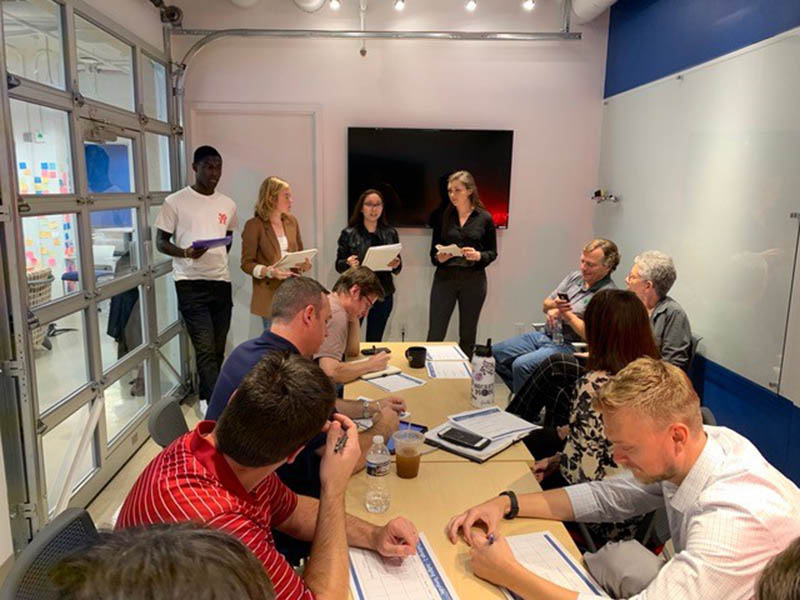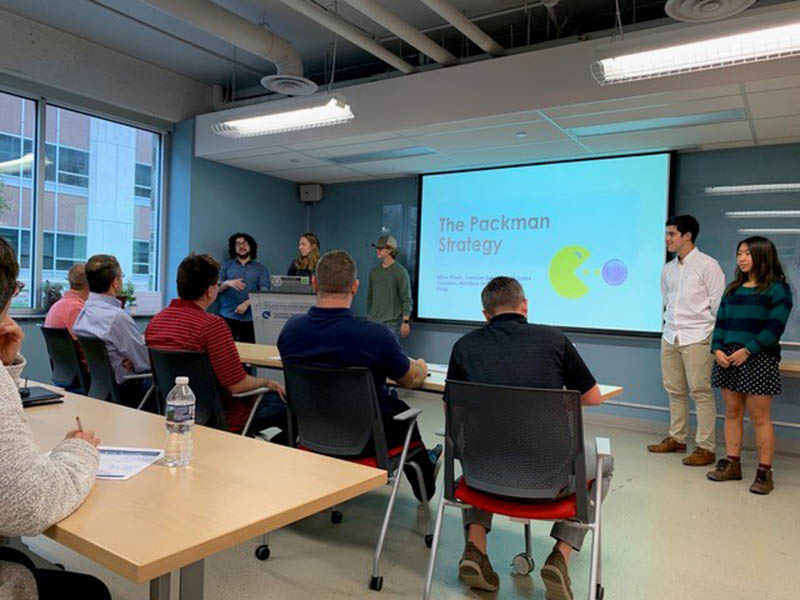Student Teams Present Innovative Ideas in Future of Packaging Hackathon
Villanova University and the College of Engineering recently hosted the triennial Future of Packaging Consortium in partnership with Dr. Mike Richmond of PTIS, a global management and packaging consulting firm, and John Mahaffie of Leading Futurists, who co-produced the program. The three-day event engaged 20 of the nation’s top companies and their leaders across the packaging value chain. The goal: roadmaps and strategies for driving toward a closed loop (zero waste) smart packaging system by 2030. Dr. Ross Lee, professor of practice in Villanova’s Sustainable Engineering program, initiated the University’s involvement, which included not only a variety of sessions, but also a student hackathon. The so-called “packathon” tasked four interdisciplinary teams with developing creative solutions to challenges facing the packaging industry.
The teams were comprised of undergraduate students representing the Engineering Entrepreneurship minor, Villanova School of Business and College of Liberal Arts and Sciences, as well as graduate students in the Sustainable Engineering program. “We were very intentional about creating cross discipline, cross gender, cross cultural teams and we were tremendously impressed with the results,” says Dr. Lee. “It was gratifying to hear a sophomore business student say that she learned so much from a PhD sustainable engineering student, and for a sustainable engineering graduate student to say they valued the supply chain perspective of a business student.”

Packaging Hackathon Presentation

Packaging Hackathon Winning Team
Over the course of three hours in the University’s Idea Lab, the teams faced three challenges. They were first asked to identify from a whole systems perspective, key characteristics of today’s packaging industry, key benefits required in future systems, and key issues that need to be addressed. The second task involved team members taking on value chain roles (i.e., raw material supplier, converter, brand owner and retailer) and reporting on the value they provide and the challenges they face for a sustainable future. The final challenge required defining and presenting their solutions—the what, why and how—to the hackathon judges. “In just a few hours, the teams successfully delivered quality 10-minute presentations articulating an integrated strategy across the packaging value chain to develop a closed loop smart packaging system in 10 years,” remarks Dr. Lee. The judges, who were also the event’s sponsors and represented the variety of value chain roles, included McDonald's (retailer), S.C. Johnson and Kraft-Heinz (brand owners), HAVI (package provider) and Georgia Pacific and WestRock (raw material providers).
Taking first place and a $1,000 prize was team Packman, comprised of Sustainable Engineering graduate students Ellen Mook, Matt Peterson and Gonzalo Sanchez and undergraduates Connie Fang ’22 VSB and Nick Ferrante ’20 ME. According to Dr. Lee, “Team Packman focused on a truly integrated supply chain strategy that brought the right technologies together for the right parts (including AI, blockchain, renewably sourced materials and energy) and included supply chain accountability via extended producer responsibility, education and international engagement.”
Connie said of the experience: “As a business major who is passionate about sustainability, I enjoyed collaborating with teammates from all different backgrounds who share a common love for our planet. The Packathon gave me more ideas about high-impact, sustainable business models, and it increased my interest in green packaging and smarter supply chain design. The events were challenging, but we received a lot of help from the sponsors to come up with our innovative packaging solution of the future.”
Judge and sponsor Sue Fangmann, US Supply Chain Services Director for McDonald's Corporation, shared her impressions of the event: “I loved how different-minded students got together and were able to absorb the complexity of the issues so quickly and look at the problems in holistic ways. I thought their ability to think big, think strategically and think thoroughly was impressive. I also thought it was an AWESOME way for more people to understand the current state. Sustainability and recovery is so complex and I don’t think a lot of people understand it or (worse yet) think they understand it when they really don’t.”
Fangmann noted the challenges facing the packaging industry, including alignment and shared purpose, adding: “We, as McDonald’s, are doing our part and making it very clear that we expect collaboration among traditional competitors to solve for recovery. It is going to take all of us rowing in the same direction to solve this in a meaningful way.”
Both Fangmann and Dr. Richmond expressed an interest in future hackathons as tools for sponsors and others to use going forward.
Dr. Lee acknowledges the contributions of his research assistant Anitha Kannan, as well as the support of Innovation, Creativity and Entrepreneurship Institute Director Ann Miller and Assistant Director Martae Giometti ’13 ChE.
